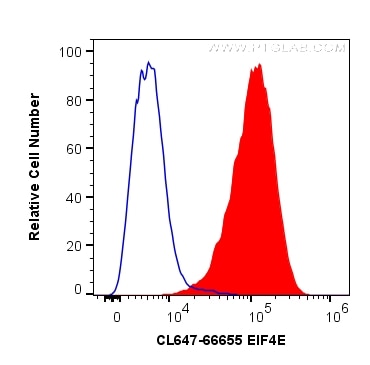- Featured Product
- KD/KO Validated
EIF4E Monoklonaler Antikörper
EIF4E Monoklonal Antikörper für FC (Intra)
Wirt / Isotyp
Maus / IgG1
Getestete Reaktivität
human, Maus, Ratte
Anwendung
FC (Intra)
Konjugation
CoraLite® Plus 647 Fluorescent Dye
CloneNo.
3C6B9
Kat-Nr. : CL647-66655
Synonyme
Geprüfte Anwendungen
| Erfolgreiche Detektion in FC (Intra) | HeLa-Zellen |
Empfohlene Verdünnung
| Anwendung | Verdünnung |
|---|---|
| Durchflusszytometrie (FC) (INTRA) | FC (INTRA) : 0.20 ug per 10^6 cells in a 100 µl suspension |
| It is recommended that this reagent should be titrated in each testing system to obtain optimal results. | |
| Sample-dependent, check data in validation data gallery | |
Produktinformation
CL647-66655 bindet in FC (Intra) EIF4E und zeigt Reaktivität mit human, Maus, Ratten
| Getestete Reaktivität | human, Maus, Ratte |
| Wirt / Isotyp | Maus / IgG1 |
| Klonalität | Monoklonal |
| Typ | Antikörper |
| Immunogen | EIF4E fusion protein Ag27191 |
| Vollständiger Name | eukaryotic translation initiation factor 4E |
| Berechnetes Molekulargewicht | 29 kDa |
| Beobachtetes Molekulargewicht | 25 kDa |
| GenBank-Zugangsnummer | BC012611 |
| Gene symbol | EIF4E |
| Gene ID (NCBI) | 1977 |
| Konjugation | CoraLite® Plus 647 Fluorescent Dye |
| Excitation/Emission maxima wavelengths | 654 nm / 674 nm |
| Form | Liquid |
| Reinigungsmethode | Protein-G-Reinigung |
| Lagerungspuffer | PBS with 50% glycerol, 0.05% Proclin300, 0.5% BSA |
| Lagerungsbedingungen | Bei -20°C lagern. Vor Licht schützen. Nach dem Versand ein Jahr stabil. Aliquotieren ist bei -20oC Lagerung nicht notwendig. 20ul Größen enthalten 0,1% BSA. |
Hintergrundinformationen
Eukaryotic translation initiation factor 4E, also known as eIF4E, is a protein that in humans is encoded by the EIF4E gene. eIF4E is the mRNA cap-binding protein, known as a general initiation factor allowing for mRNA-ribosome interaction and cap-dependent translation in eukaryotic cells. eIF4E is a polypeptide that exists as both a free form and as part of the eIF4F pre-initiation complex. Regulation of eIF4E may be achieved via three distinct mechanisms: transcription, phosphorylation, and inhibitory proteins.
Protokolle
| PRODUKTSPEZIFISCHE PROTOKOLLE | |
|---|---|
| FC protocol for CL Plus 647 EIF4E antibody CL647-66655 | Download protocol |
| STANDARD-PROTOKOLLE | |
|---|---|
| Klicken Sie hier, um unsere Standardprotokolle anzuzeigen |


